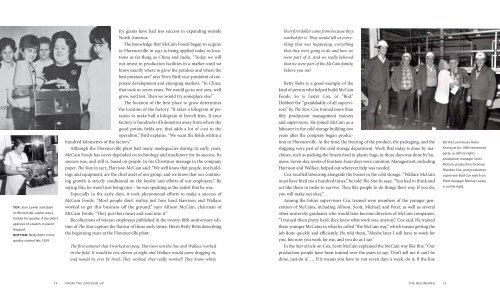From the Ground Up - McCain Foods Limited
From the Ground Up - McCain Foods Limited
From the Ground Up - McCain Foods Limited
You also want an ePaper? Increase the reach of your titles
YUMPU automatically turns print PDFs into web optimized ePapers that Google loves.
TOP: Jean Lawler and team<br />
in <strong>the</strong> test lab. Lawler was a<br />
stickler for quality: if she didn’t<br />
approve of a batch, it wasn’t<br />
shipped.<br />
BOTTOm: Betty Betts in <strong>the</strong><br />
quality-control lab, 1959.<br />
fry giants have had less success in expanding outside<br />
North America.<br />
The knowledge that <strong>McCain</strong> <strong>Foods</strong> began to acquire<br />
in Florenceville in 1957 is being applied today in locations<br />
as far-flung as China and India. “Today we will<br />
not invest in production facilities in a market until we<br />
know exactly where to grow <strong>the</strong> potatoes and where <strong>the</strong><br />
best potatoes are,” says Terry Bird, vice-president of corporate<br />
development and emerging markets. “In China,<br />
that took us seven years. We would go to one area, we’d<br />
grow, we’d test. Then we would try someplace else.”<br />
The location of <strong>the</strong> best place to grow determines<br />
<strong>the</strong> location of <strong>the</strong> factory. “It takes a kilogram of potatoes<br />
to make half a kilogram of french fries. If your<br />
factory is hundreds of kilometres away from where <strong>the</strong><br />
good potato fields are, that adds a lot of cost to <strong>the</strong><br />
operation,” Bird explains. “We want <strong>the</strong> fields within a<br />
hundred kilometres of <strong>the</strong> factory.”<br />
Although <strong>the</strong> Florenceville plant had many inadequacies during its early years,<br />
<strong>McCain</strong> <strong>Foods</strong> has never depended on technology and machinery for its success. Its<br />
success was, and still is, based on people. In his Christmas message in <strong>the</strong> company<br />
paper, The Star, in 1972, Harrison <strong>McCain</strong> said: “We well know that people, not buildings<br />
and equipment, are <strong>the</strong> chief asset of our group, and we know that our continuing<br />
growth is strictly conditional on <strong>the</strong> loyalty and efforts of our employees.” By<br />
saying this, he wasn’t just being nice – he was speaking as <strong>the</strong> realist that he was.<br />
Especially in <strong>the</strong> early days, it took phenomenal efforts to make a success of<br />
<strong>McCain</strong> <strong>Foods</strong>. “Most people don’t realize just how hard Harrison and Wallace<br />
worked to get this business off <strong>the</strong> ground,” says Allison <strong>McCain</strong>, chairman of<br />
<strong>McCain</strong> <strong>Foods</strong>. “They put <strong>the</strong>ir heart and soul into it.”<br />
Recollections of veteran employees published in <strong>the</strong> twenty-fifth-anniversary edition<br />
of The Star capture <strong>the</strong> flavour of those early times. Here’s Betty Betts describing<br />
<strong>the</strong> beginning years at <strong>the</strong> Florenceville plant:<br />
The first summer that I worked on peas, Harrison ran <strong>the</strong> line and Wallace worked<br />
in <strong>the</strong> field. It would be ten, eleven at night and Wallace would come dragging in,<br />
and would he ever be tired. They worked, <strong>the</strong>y really worked! They know where<br />
<strong>the</strong>ir first dollar came from because <strong>the</strong>y<br />
worked for it. They would tell us everything<br />
that was happening, everything<br />
that <strong>the</strong>y were going to do and how we<br />
were part of it. And we really believed<br />
that we were part of <strong>the</strong> <strong>McCain</strong> family,<br />
believe you me!<br />
Betty Betts is a good example of <strong>the</strong><br />
kind of person who helped build <strong>McCain</strong><br />
<strong>Foods</strong>. So is Lester Cox, or “Bud.”<br />
Dubbed <strong>the</strong> “granddaddy of all supervisors”<br />
by The Star, Cox trained more than<br />
fifty production management trainees<br />
and supervisors. He joined <strong>McCain</strong> as a<br />
labourer in <strong>the</strong> cold storage building two<br />
years after <strong>the</strong> company began production<br />
in Florenceville. At <strong>the</strong> time, <strong>the</strong> freezing of <strong>the</strong> product, <strong>the</strong> packaging, and <strong>the</strong><br />
shipping were part of <strong>the</strong> cold storage department. Work that today is done by machines,<br />
such as packing <strong>the</strong> frozen food in plastic bags, in those days was done by humans.<br />
Seven-day weeks of fourteen-hour days were common. Management, including<br />
Harrison and Wallace, helped out wherever help was needed.<br />
Cox recalled labouring alongside <strong>the</strong> bosses in <strong>the</strong> cold storage. “Wallace <strong>McCain</strong><br />
must have fired me a hundred times,” he told The Star in 1992. “You had to think and<br />
act like <strong>the</strong>m in order to survive. They like people to do things <strong>the</strong>ir way. If you do,<br />
you will make out okay.”<br />
Among <strong>the</strong> future supervisors Cox trained were members of <strong>the</strong> younger generation<br />
of <strong>McCain</strong>s, including Allison, Scott, Michael, and Peter, as well as several<br />
o<strong>the</strong>r university graduates who would later become directors of <strong>McCain</strong> companies.<br />
“I trained <strong>the</strong>m pretty hard; <strong>the</strong>y knew what work was, anyway,” Cox said. He trained<br />
<strong>the</strong>se younger <strong>McCain</strong>s in what he called “<strong>the</strong> <strong>McCain</strong> way,” which means getting <strong>the</strong><br />
job done quickly and efficiently. He told <strong>the</strong>m, “Maybe later I will have to work for<br />
you, but now you work for me, and you do as I say.”<br />
In <strong>the</strong> Star article on Cox, Scott <strong>McCain</strong> explained <strong>the</strong> <strong>McCain</strong> way like this: “Our<br />
production people have been trained over <strong>the</strong> years to say, ‘Don’t tell me it can’t be<br />
done, just do it.’ … If it means you have to run seven days a week, do it. If <strong>the</strong> line<br />
14 <strong>From</strong> <strong>the</strong> <strong>Ground</strong> up<br />
t he BeG inninG 15<br />
Bertha Lunn kisses Harry<br />
Kinney at his 1983 retirement<br />
party, as (left to right)<br />
production manager Scott<br />
<strong>McCain</strong>, production foreman<br />
Sherdon Cox, and production<br />
supervisor Bud Cox watch on.<br />
Plant manager Murray Lovely<br />
is on <strong>the</strong> right.






